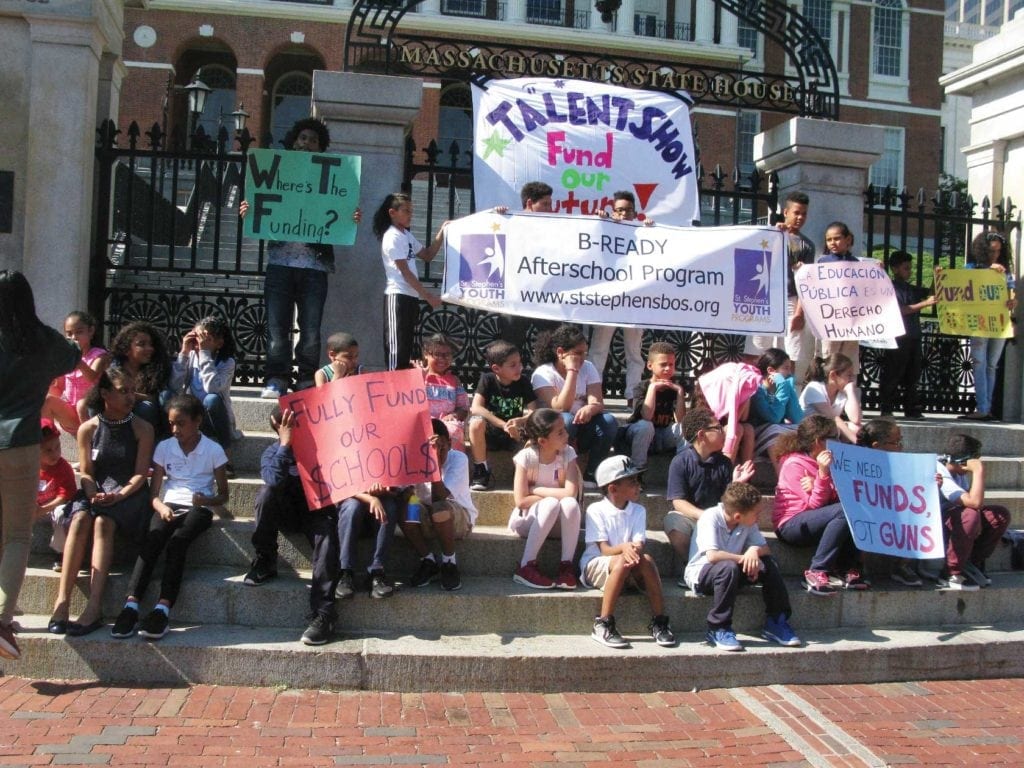Students press House for education funds
Senate education bill languishes in House

Last Tuesday, dozens of school students from a South End after-school program demonstrated outside the State House, holding a talent show on the front steps to press the Legislature to increase funding for public schools.
Sharing what they hope to be when they grow up as they introduced themselves, the students invited legislators to the show, hoping to convince House leaders to vote on and pass An Act Modernizing the Foundation Budget for the 21st Century, which would provide what advocates say is a more accurate budget for public education in Massachusetts and fix the $1 billion to $2 billion gap in the current education budget.

Students demonstrate for increased education funding in front of the State House. Photo credit: Saphia Suarez
The Senate passed the bill in a unanimous vote last month, but House leadership has given no indication they will take the matter up before the current session ends July 31. A budget amendment with language similar to the Senate bill gained 88 House sponsors, but the language was not included in the latest version of the House budget. Another bill with language similar to the Senate bill has languished in the House with no action taken.
Activists at last week’s dem-
onstration said they hoped to pressure legislators to take action.
“It’s clear that if they’re not going to vote on it, it means that education and our kids aren’t their priority,” said Ariel Branz, a parent organizer with the St. Stephen’s after-school program.” We want them to prioritize our kids’ future.”
The talent show was aimed at getting the attention of legislators, several of whom stopped by to listen.
“We know that are public school students are super talented, and we also know that their schools are underfunded, and so they’re not given the opportunities that they deserve,” Branz said. “That’s why we’re here, to show our students’ talents and to say, it’s time to step up and invest in the future of our kids. We’re calling on Speaker [Robert] DeLeo and the rest of the House leadership to bring the bill to a vote.”
Disproportionate impact
The gap between the chapter 70 funds the state allocates to districts and the actual cost of running the districts affects schools across the state, but the shortfall disproportionately affects schools in low-income communities. Special education and English language learner programs are in higher demand in low-income communities. As the number of English language learners and special education students has increased, so too has the cost of health care, further straining school budgets. Yet the state’s education budget has not accounted for these factors. In fact, the budget has not been amended or updated since 1993, when the foundation budget for education was created.
The Act Modernizing the Foundation Budget for the 21st Century implements the recommendations made by the Foundation Budget Review Commission, which found that the old formula was underestimating the cost of public education by up to $2 billion.
“We’ve noticed how some schools have become more underfunded,” said Valentina, a senior at the John D. O’Bryant School of Mathematics and Science and a youth organizer at St. Stephens.
Valentina and the other high school organizers planned this action after realizing that a lot of their other efforts to call attention to this bill were going largely unnoticed.
“We decided that it would be more powerful if we have little kids who are affected by this, probably more than us, [at the center of this action],” said Michelle, another teen organizer.
Michelle and her friends are almost done with high school, and said they knew their younger siblings and the elementary school students at St. Stephen’s would be most affected by this bill.
The talent show stars themselves were acutely aware of the impact of this bill on their public education.
“We’re here to show them that we have talent and we need them to give public schools more money,” said Adrian M., a fifth-grader at the Hurley School.
When one of the counselors brought him over to talk to the Banner, the counselor mentioned that Adrian wants to be mayor when he’s older. The boy quickly shook his head and said he was aiming much higher than that.
However, the new education bill might not be on the House docket this year. With this year’s legislative session coming to a close later this month, chances are slim that House leaders will bring the bill to a vote. St. Stephen’s held their event in advance of the House debate last Thursday with the hope that the House would discuss the bill, but the topic never made it to the floor.


![Banner [Virtual] Art Gallery](https://baystatebanner.com/wp-content/uploads/2024/04/Cagen-Luse_Men-at-store-e1713991226112-150x150.jpg)



